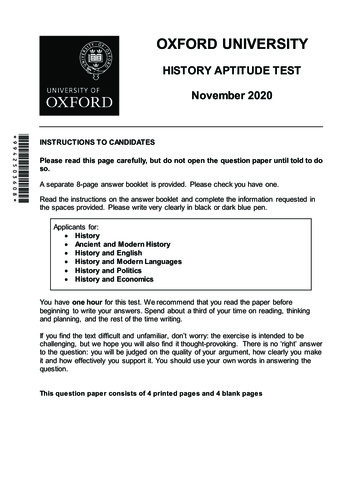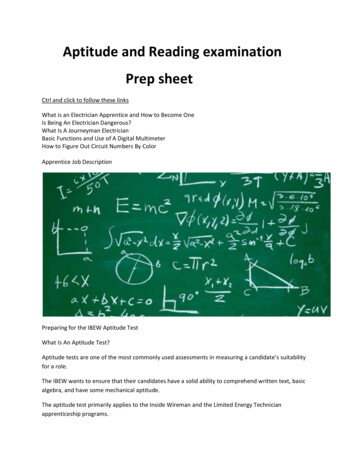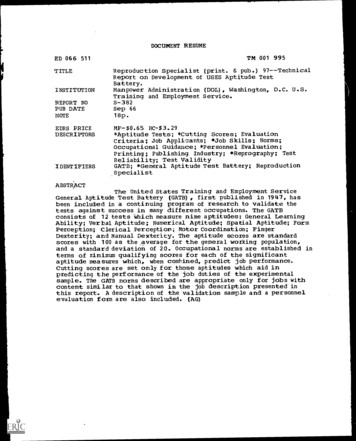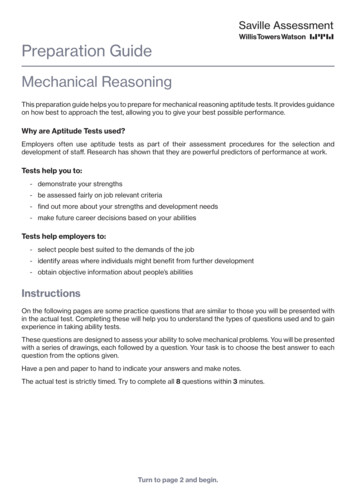
Transcription
OXFORD UNIVERSITYHISTORY APTITUDE TESTNovember 2020 INSTRUCTIONS TO CANDIDATESPlease read this page carefully, but do not open the question paper until told to doso.A separate 8-page answer booklet is provided. Please check you have one.Read the instructions on the answer booklet and complete the information requested inthe spaces provided. Please write very clearly in black or dark blue pen.Applicants for:x Historyx Ancient and Modern Historyx History and Englishx History and Modern Languagesx History and Politicsx History and EconomicsYou have one hour for this test. We recommend that you read the paper beforebeginning to write your answers. Spend about a third of your time on reading, thinkingand planning, and the rest of the time writing.If you find the text difficult and unfamiliar, don’t worry: the exercise is intended to bechallenging, but we hope you will also find it thought-provoking. There is no ‘right’ answerto the question: you will be judged on the quality of your argument, how clearly you makeit and how effectively you support it. You should use your own words in answering thequestion.This question paper consists of 4 printed pages and 4 blank pages
OXFORD UNIVERSITY HISTORY APTITUDE TEST 2020NOTE: This test consists of one question based on a passage from a primary source. Youdo not need to know anything about the author of the passage or the context in which itwas written to answer the question. Candidates will not be rewarded for making use ofany outside knowledge, or penalised for omitting accents from personal names in theiranswers.This passage is taken from Juvaynţ’s History of the World-Conqueror, which recounted theconquests of Genghis Khan and his successors as they created the Mongol empire, whichstretched from China to the Mediterranean. Juvaynţ was an administrator and scholar froma powerful Persian family, who rose to become the Mongol governor of the regionequivalent to modern-day Iraq from 1258. He knew the empire’s ruling family personally,and was present for some of the events described in the passage, notably the process bywhich a new ruler, Güyük Khan, was selected and assumed power in 1246. Juvaynţ beganwriting his History in 1251, during a period spent at the imperial capital in central Mongolia.‘Khan’ and ‘Khatun’ in this passage mean ‘ruler’ and ‘ruler’s wife’.The relationships between some of the people named in the text are illustrated below.Question: What can we learn from this document about the expectations and realities ofrulership in the Mongol empire?When the Ruler of the World, Ögedei Khan, passed away [in 1241], Güyük, his eldest son,had not returned from a campaign in the west of the empire. Therefore, in accordance withprecedent, the dispatch of orders and the assembling of the people took place at the doorof the camp of his favourite wife, Möge Khatun. But since another of Ögedei’s wives,Töregene Khatun, was the mother of his eldest sons and was moreover shrewder and wiserthan Möge Khatun, she took it on herself to send messages to the princes – the brothersand nephews of the Khan – and told them of the death of Ögedei. She said that until a Khanwas appointed by agreement someone would have to be ruler so that the business of thestate might not be neglected nor the affairs of the community be thrown into confusion; inorder, too, that the army and the court might be kept under control and the interests of thepeople protected.
Chagatai and the other princes sent representatives to say that Töregene Khatun was themother of the princes who had a right to put themselves forward to be the Khan; therefore,until an assembly was held, it was she that should direct the affairs of the state, and the oldministers should remain in the service of the court, so that the legal system might not bechanged.Now Töregene Khatun was a very shrewd and capable woman, and her position was greatlystrengthened by this unity and concord. And when Möge Khatun shortly afterwards died, byĮnesse and cunning Töregene obtained control of all affairs of state and won over thehearts of her relatives by all kind of favours and kindnesses and by sending them gifts andpresents. And for the most part strangers and relations, family and army inclined towardsher, and submitted themselves obediently and gladly to her commands and prohibitions,and came under her sway. And all manner of men bent their steps towards her while thechief secretary Chinqai and the other ministers of the former Khan continued to performtheir duties as before, and the governors on every side remained at their posts.During the lifetime of the Khan there had accumulated in Töregene’s breast a feeling ofhatred towards certain of the courtiers, and the wound had grown deep. When she wasentrusted with affairs of state, and her position had grown strong, and none dared quarrelor dispute with her, she determined to seek relief from her pain by avenging herself on eachof these persons. She accordingly sent messengers to northern China to fetch its governor,Mahmƻd Yalavach, and also tried to lay hands on Chinqai. Chinqai, however, perceived thatshe had something else in mind; and before her plan could be realized he hastened toKöten, her son, and sought his protection. As for Yalavach, when the messengers reachedhim, he welcomed them with marks of respect and honour. Every day he showed themfresh attentions and civilities, and two or three days passed by in this way; but all this timehe was secretly preparing to flee and, on the third night, he put the messengers to sleep anddeparted to Köten together with a few horsemen, and escaped from their hands.And when both notables reached Köten and sought refuge with him, making his thresholdtheir asylum, they were embraced with his favour. Töregene Khatun sent a messenger todemand their return, and Köten replied: ‘These men have sought sanctuary with us. To sendthem back is forbidden by the code of magnanimity and humanity and is remote from thepractice of generosity and liberality. An assembly is shortly to be held: let their crimes andoffences be brought to the attention of the family and the military commanders, and letthem receive whatever punishment they deserve.’ When she realized that their return wasimpossible, she endeavoured to persuade ‘Imad-al-Mulk Muhammad of Khotan, who hadbeen one of the ministers of the Khan, to fabricate some false allegations so that they mightbe punished at the great assembly. But since loyalty and generosity – which are amongstthe most essential and the most beautiful of the characteristics of the great – had gainedmastery of his being, he refused to consent to the shame and disgrace of slander andcalumny.And Oghul Qaimish [Güyük’s wife, and, later, ruler of the empire after his death] and thewives of Chagatai sent Arghun to seize Körgüz [governor of Khurasan, central Asia]. Andwhen Arghun brought Körgüz to Töregene Khatun, she imprisoned Körgüz because of anancient grudge and sent Arghun to Khurasan in his stead.
And at that time there was a woman called Fatima, who had acquired great inŇuence in theservice of Töregene Khatun and to whose counsel and capability were entrusted all affairs ofstate. Fatima exalted her agent, ‘Abd al-RahmĈn, and sent him to northern China asgovernor in place of Yalavach.And everyone sent ambassadors in every direction and broadcast drafts and assignments;and upon every side they attached themselves to factions and followed their instructions—all save Sorqoqtani Beki and her sons, who did not swerve one hair’s breath from the law oftheir ordinances. [Sorqoqtani subsequently played a similar role to Töregene by ensuringthe eventual succession of her eldest son after Güyük’s death in 1248.]As for Töregene Khatun, she dispatched ambassadors to the East and the West and to theNorth and South of the world to summon the sultans, military commanders and governors,and to bid them to the assembly.Meanwhile Güyük had not yet returned and his place seemed empty, and Genghis Khan’sbrother Temüge thought to seize the position of Khan by force and violence. With thisintention he set out for the camp of the Khan. When he drew near, Mengli Oghul, a son ofÖgedei’s by a concubine, approached him with his retinue and troops and made him repentof his design. Meanwhile there came tidings of the arrival of Güyük, whereupon hisrepentance increased.And when Güyük came to his mother, he took no part in affairs of state, and TöregeneKhatun still executed the decrees of the empire although her son was Khan. But when twoor three months had passed and the son was somewhat estranged from his mother onaccount of Fatima, Töregene passed away [in 1246].
BLANK PAGE
BLANK PAGE
BLANK PAGE
HISTORY APTITUDE TEST November 2020 INSTRUCTIONS TO CANDIDATES Please read this page carefully, but do not open the question paper until told to do so. A separate 8-page answer booklet is provided. Please check you have one. Read the instructions on the answer booklet and c










